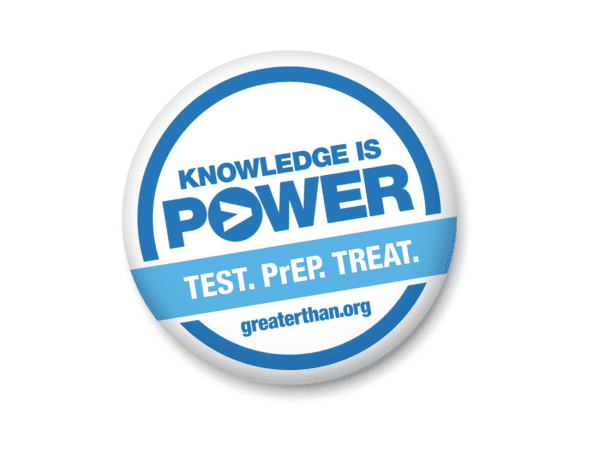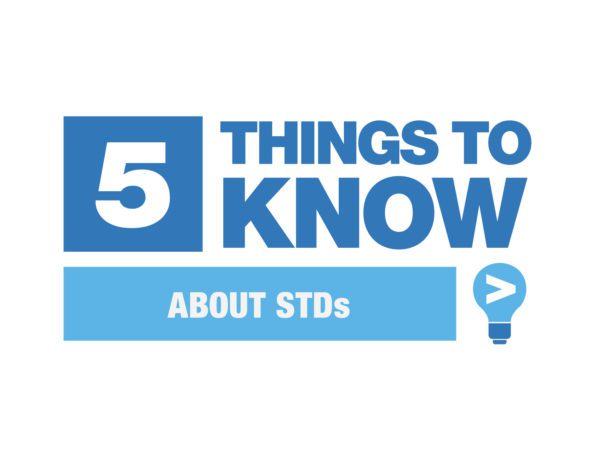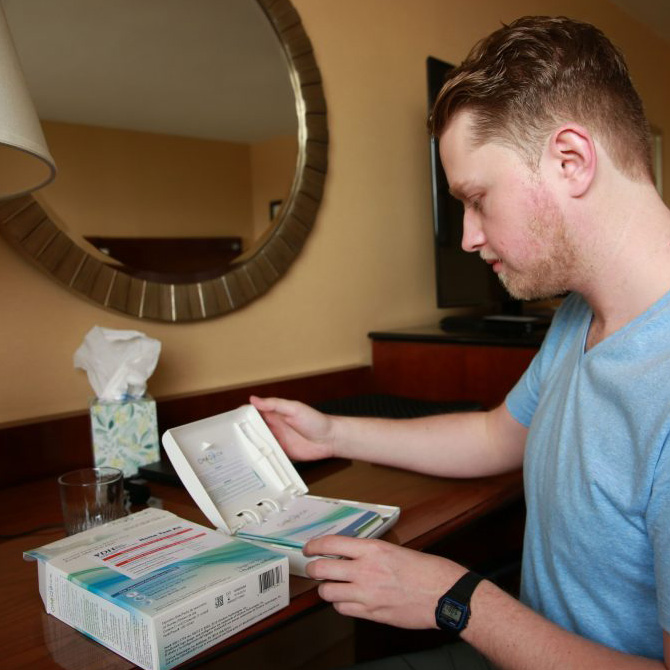-
Find Virginia Services
Looking for HIV and STD testing near you in Virginia? Use Resource Connections, our online directory, to find testing and other services throughout the state
There are more options for testing than ever before. VDH-funded testing is usually free or low-cost. Testing for STDs, HIV, mpox, and viral hepatitis is available throughout the state. This includes:
-
- local health departments,
- healthcare clinics,
- community-based organizations,
- and pharmacies.
There is no wrong door to testing!
Find out what works best for you and make testing part of your normal healthcare routine. Use our page to find information, testing resources, and what next steps are after testing.

Where Can I Get Tested in Virginia?
There are over 100 local health departments that offer testing services. This includes STD, HIV, mpox, and viral hepatitis testing. Testing at local health departments is laboratory-based. This means that you will have your blood drawn. You will have to return to receive your results a different day.
Find a health department clinic near you.
These services are available for free or at low-cost. The cost depends on your income. VDH requires health insurance information and proof of household income for services. This information determines if you are eligible for a discount in services. If you do not have insurance/income information, please ask the front desk staff for more information at the location you visit.
Questions about testing at a local health department? Contact a hotline counselor.
VDH funds agencies throughout Virginia that offer free testing for HIV, hepatitis C, and STIs. Some tests offered at these locations are rapid. This means your results will be ready in about 20 minutes. Other tests offered at these agencies will requires a blood draw. That blood sample will have to be sent to a lab. You will have to return to receive your results. Many agencies offer non-traditional and extended hours for your convenience. Use the VDH Resource Connections directory to find details about an agency near you.
For questions about testing at an agency near you, contact a hotline counselor.
Pharmacy testing will soon be available in Virginia. Select pharmacies will offer rapid HIV and hepatitis testing. For more information/updates, visit our pharmacy testing page. You can also contact a Virginia hotline counselor.
VDH offers HIV self-test kits to people living in Virginia. You must complete a short, confidential survey to determine your eligibility. After that, a free self-test kit will be shipped discreetly at no cost to you. If you live in Virginia or Maryland and cannot access testing through other options, please consider using our program. You can read more about the program on our Virginia Gets Tested page. If you have additional questions, or need help with the survey, please contact one of our Virginia hotline counselors.
VDH and Analyte Health are working together to provide free blood-based HIV and syphilis testing for Virginians at Labcorp and Quest locations across Virginia.
Syphilis rates in Virginia have increased at an alarming rate among all groups over the past ten years. Syphilis is particularly dangerous to pregnant women and babies.
Nearly 4,000 Virginians were infected with HIV between 2018 and 2022. A free HIV test can help guide you to the right prevention or treatment option.
How to Get a Free Syphilis and/or HIV Test
1. (Optional) Find a participating location near you based on your ZIP code .
2. Call STDcheck.com’s test scheduling line: 800-456-2323
3. Press 1 to request your free syphilis or HIV test
4. Tell the scheduling representative that you are a resident of Virginia.
Please note: HIV and syphilis tests are free to residents of Virginia. STDcheck.com also offers testing for other STIs. Testing for other conditions besides HIV and/or syphilis may carry a charge.
5. Schedule a time and location convenient for you.
6. Receive free HIV and/or syphilis testing at your scheduled appointment.
Disclaimer: This notice of the availability of free testing for HIV and syphilis is intended to inform the public in keeping with the VDH mission to preserve the health and promote the wellbeing of all Virginians. It does not constitute an official endorsement of Analyte Health or its subsidiaries. VDH is not responsible for the content of third-party websites, and is not responsible for the conduct or services of third parties.

5 Things to Know About STDs
-
- STDs are very common.
- STDs often show no symptoms. Many people with an STD don’t know it.
- If left untreated, STDs can cause serious health problems.
- Good news! All STDs are treatable (including HIV), and many are curable.
- To know for sure you are being tested, ASK to be tested!
Hotline Counselors
For general questions about STDs, including HIV, mpox, and viral hepatitis, you can connect to a counselor today. Both the VDH and CDC have dedicated hotlines to answer your questions. They can also connect you to resources or talk with you about your test results.
Virginia Disease Prevention Hotline
-
- (800) 533-4148
- hiv-stdhotline@vdh.virginia.gov
- Hours: Monday-Friday, 8am to 5pm; closed on Virginia State Holidays
CDC Hotline
-
- (800) CDC-INFO (800-232-4636)
- (888) 232-6348 (TTY/TeleTYpe)
- cdcinfo@cdc.gov
- Hours: Monday-Friday, 8am to 8pm

Negative Test: What's Next?
After testing negative for STDs, consider ongoing prevention strategies. This could include wearing condoms consistently and correctly. It may include PrEP, for people who do not have HIV and want added protection. It can include making testing part of your routine healthcare so you know your status. There are many options available for ongoing prevention strategies.
HIV and other STIs cannot be detected by most tests for a certain window of time after infection. This is when your body is still making the antibodies the test looks for. We call this the “window period.” The window period can last up to 12 weeks after becoming infected. Talk with your healthcare provider or call a hotline counselor about follow-up testing if you have questions about the window period, or if you believe follow-up testing may be needed. Read more about the window period on the Greater Than AIDS website.
PEP for HIV
If you think you have been exposed to HIV within the last 72 hours, PEP – post exposure prophylaxis – may be an option. PEP is extremely time sensitive. To talk over a possible exposure and to be connected to resources for PEP immediately, reach out to a hotline counselor to learn about your options. If you need to access PEP services during non-business hotline hours, please contact your healthcare provider or go to your nearest emergency room.

Positive Test: What's Next?
Some positive tests need to be confirmed through additional testing, and some do not. Below is more information about next steps depending on the type of positive test.
If you had a positive rapid test for HCV, your result needs to be confirmed with a conventional blood draw. A conventional test for HCV can be performed by:
-
- your healthcare provider,
- your local health department, or
- some non-profit agencies that offer testing.
Visit Resource Connections to find VDH-supported locations that offer conventional HCV testing.
HCV Treatment
With a positive conventional test for HCV, you should seek treatment. Otherwise, you could suffer permanent damage to your liver. New medicines for HCV treatment can cure the condition in about 3 months. A Hotline Counselor can help you locate your closest HCV treatment provider. You can also find HCV treatment resources on the Virginia HEPC website.
If you had a positive result on an HIV self-test, your result needs to be confirmed with further testing. This can be either two rapid tests performed in a row, or a conventional blood draw. Visit Resource Connections or contact a Hotline Counselor for help locating an HIV test site near you.
HIV Treatment
With a confirmed positive test for HIV, you will start daily antiretroviral medication to lower your viral load. While not a cure, it is possible to reduce the viral load to levels so low that they cannot be detected by lab tests. This is called being “undetectable.” When HIV is undetectable, it cannot be passed to others through sex.
With ongoing treatment, you can live a healthy, normal lifespan. Learn more about living with HIV.
Hotline counselors are available to talk to you about test results and next steps.
Partner Notification Services
It is important to notify your sex partner(s) or anyone you share needles with if you test positive for any STDs, HIV, mpox, or viral hepatitis. Your partner(s) need to know that they may have been exposed so they can get tested and treated, if necessary. If your partner is not informed and treated, you could get the infection again. Learn about several options you have to notify your partner(s).
